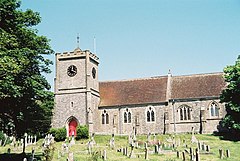West Lulworth
| West Lulworth | |
|---|---|
 Parish church of the Holy Trinity |
|
| West Lulworth shown within Dorset | |
| Population | 714 |
| OS grid reference | SY825807 |
| District | |
| Shire county | |
| Region | |
| Country | England |
| Sovereign state | United Kingdom |
| Police | Dorset |
| Fire | Dorset and Wiltshire |
| Ambulance | South Western |
| EU Parliament | South West England |
West Lulworth is a village and civil parish in the Purbeck district of Dorset, England, situated on the English Channel beside Lulworth Cove. In the 2011 census the civil parish—which includes most of Lulworth Camp army base—had 291 households and a population of 714. The village is a gateway to the Jurassic Coast world heritage site and is a popular tourist destination, especially for day trips.
In 1086 in the Domesday Book West Lulworth was not distinguished from neighbouring East Lulworth; only one settlement was recorded, called Luluorde, Luluworde or Loloworde. It had 38.3 households, was in Winfrith Hundred and the lord and tenant-in-chief was Aiulf the chamberlain. Despite this, East and West Lulworth may have been separate settlements at this time, and definitely were so by the end of the 13th century.
The Castle Inn is one of the oldest pubs in Dorset, dating from the 16th century. Holy Trinity parish church was originally in the village centre, but was demolished in 1869 although the old churchyard still remains. The present church, built of local stone taken from the cove, replaced it. It was largely financed by the then incumbent Rev. William Gildea, brother of philanthropist Sir James Gidea.
From the late seventeenth to the mid nineteenth century smugglers used Lulworth Cove and other bays and beaches nearby. The building of coastguard cottages, which housed the customs officers still stand above the cove. Lulworth at one point had a mill, powered by water from a nearby spring. It was burnt down during the 19th century and all that remains of its existence is the millpond.
...
Wikipedia

